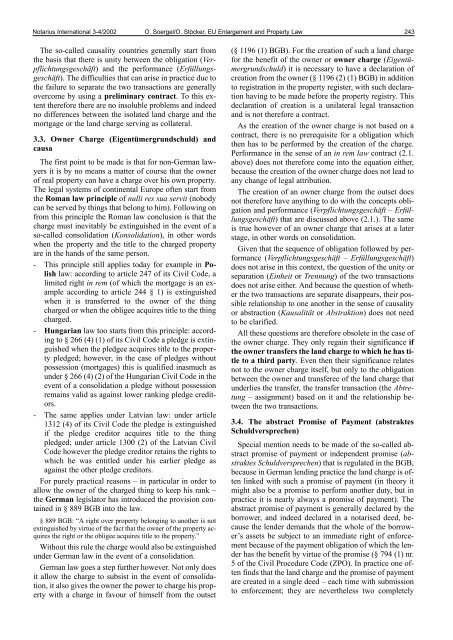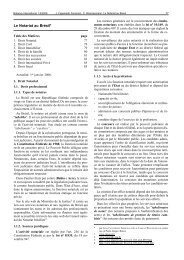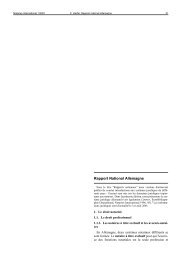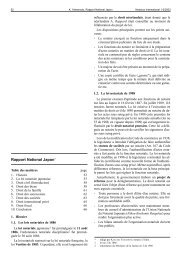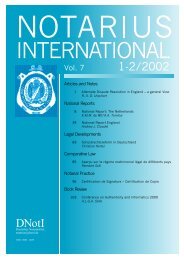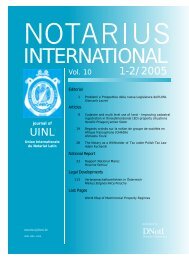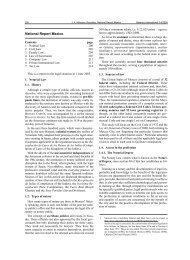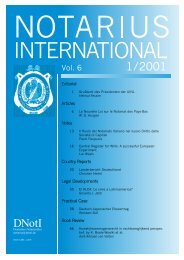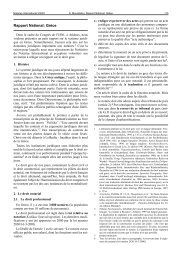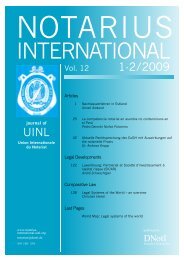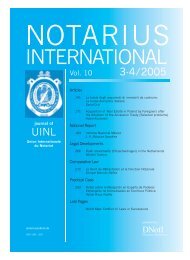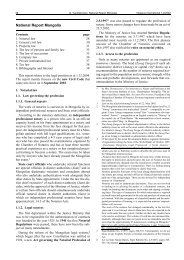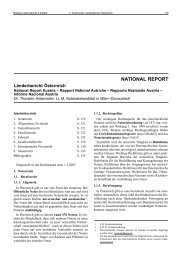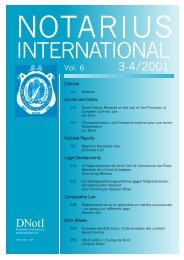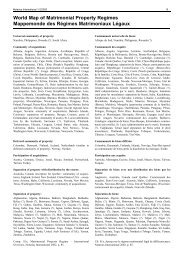ARTICLES and NOTES - Notarius International
ARTICLES and NOTES - Notarius International
ARTICLES and NOTES - Notarius International
Create successful ePaper yourself
Turn your PDF publications into a flip-book with our unique Google optimized e-Paper software.
<strong>Notarius</strong> <strong>International</strong> 3-4/2002 O. Soergel/O. Stöcker, EU Enlargement <strong>and</strong> Property Law 243<br />
The so-called causality countries generally start from<br />
the basis that there is unity between the obligation (Verpflichtungsgeschäft)<br />
<strong>and</strong> the performance (Erfüllungsgeschäft).<br />
The difficulties that can arise in practice due to<br />
the failure to separate the two transactions are generally<br />
overcome by using a preliminary contract. To this extent<br />
therefore there are no insoluble problems <strong>and</strong> indeed<br />
no differences between the isolated l<strong>and</strong> charge <strong>and</strong> the<br />
mortgage or the l<strong>and</strong> charge serving as collateral.<br />
3.3. Owner Charge (Eigentümergrundschuld) <strong>and</strong><br />
causa<br />
The first point to be made is that for non-German lawyers<br />
it is by no means a matter of course that the owner<br />
of real property can have a charge over his own property.<br />
The legal systems of continental Europe often start from<br />
the Roman law principle of nulli res sua servit (nobody<br />
can be served by things that belong to him). Following on<br />
from this principle the Roman law conclusion is that the<br />
charge must inevitably be extinguished in the event of a<br />
so-called consolidation (Konsolidation), in other words<br />
when the property <strong>and</strong> the title to the charged property<br />
are in the h<strong>and</strong>s of the same person.<br />
- This principle still applies today for example in Polish<br />
law: according to article 247 of its Civil Code, a<br />
limited right in rem (of which the mortgage is an example<br />
according to article 244 § 1) is extinguished<br />
when it is transferred to the owner of the thing<br />
charged or when the obligee acquires title to the thing<br />
charged.<br />
- Hungarian law too starts from this principle: according<br />
to § 266 (4) (1) of its Civil Code a pledge is extinguished<br />
when the pledgee acquires title to the property<br />
pledged; however, in the case of pledges without<br />
possession (mortgages) this is qualified inasmuch as<br />
under § 266 (4) (2) of the Hungarian Civil Code in the<br />
event of a consolidation a pledge without possession<br />
remains valid as against lower ranking pledge creditors.<br />
- The same applies under Latvian law: under article<br />
1312 (4) of its Civil Code the pledge is extinguished<br />
if the pledge creditor acquires title to the thing<br />
pledged; under article 1300 (2) of the Latvian Civil<br />
Code however the pledge creditor retains the rights to<br />
which he was entitled under his earlier pledge as<br />
against the other pledge creditors.<br />
For purely practical reasons – in particular in order to<br />
allow the owner of the charged thing to keep his rank –<br />
the German legislator has introduced the provision contained<br />
in § 889 BGB into the law.<br />
§ 889 BGB: “A right over property belonging to another is not<br />
extinguished by virtue of the fact that the owner of the property acquires<br />
the right or the obligee acquires title to the property.”<br />
Without this rule the charge would also be extinguished<br />
under German law in the event of a consolidation.<br />
German law goes a step further however. Not only does<br />
it allow the charge to subsist in the event of consolidation,<br />
it also gives the owner the power to charge his property<br />
with a charge in favour of himself from the outset<br />
(§ 1196 (1) BGB). For the creation of such a l<strong>and</strong> charge<br />
for the benefit of the owner or owner charge (Eigentümergrundschuld)<br />
it is necessary to have a declaration of<br />
creation from the owner (§ 1196 (2) (1) BGB) in addition<br />
to registration in the property register, with such declaration<br />
having to be made before the property registry. This<br />
declaration of creation is a unilateral legal transaction<br />
<strong>and</strong> is not therefore a contract.<br />
As the creation of the owner charge is not based on a<br />
contract, there is no prerequisite for a obligation which<br />
then has to be performed by the creation of the charge.<br />
Performance in the sense of an in rem law contract (2.1.<br />
above) does not therefore come into the equation either,<br />
because the creation of the owner charge does not lead to<br />
any change of legal attribution.<br />
The creation of an owner charge from the outset does<br />
not therefore have anything to do with the concepts obligation<br />
<strong>and</strong> performance (Verpflichtungsgeschäft – Erfüllungsgeschäft)<br />
that are discussed above (2.1.). The same<br />
is true however of an owner charge that arises at a later<br />
stage, in other words on consolidation.<br />
Given that the sequence of obligation followed by performance<br />
(Verpflichtungsgeschäft – Erfüllungsgeschäft)<br />
does not arise in this context, the question of the unity or<br />
separation (Einheit or Trennung) of the two transactions<br />
does not arise either. And because the question of whether<br />
the two transactions are separate disappears, their possible<br />
relationship to one another in the sense of causality<br />
or abstraction (Kausalität or Abstraktion) does not need<br />
to be clarified.<br />
All these questions are therefore obsolete in the case of<br />
the owner charge. They only regain their significance if<br />
the owner transfers the l<strong>and</strong> charge to which he has title<br />
to a third party. Even then their significance relates<br />
not to the owner charge itself, but only to the obligation<br />
between the owner <strong>and</strong> transferee of the l<strong>and</strong> charge that<br />
underlies the transfer, the transfer transaction (the Abtretung<br />
– assignment) based on it <strong>and</strong> the relationship between<br />
the two transactions.<br />
3.4. The abstract Promise of Payment (abstraktes<br />
Schuldversprechen)<br />
Special mention needs to be made of the so-called abstract<br />
promise of payment or independent promise (abstraktes<br />
Schuldversprechen) that is regulated in the BGB,<br />
because in German lending practice the l<strong>and</strong> charge is often<br />
linked with such a promise of payment (in theory it<br />
might also be a promise to perform another duty, but in<br />
practice it is nearly always a promise of payment). The<br />
abstract promise of payment is generally declared by the<br />
borrower, <strong>and</strong> indeed declared in a notarised deed, because<br />
the lender dem<strong>and</strong>s that the whole of the borrower’s<br />
assets be subject to an immediate right of enforcement<br />
because of the payment obligation of which the lender<br />
has the benefit by virtue of the promise (§ 794 (1) nr.<br />
5 of the Civil Procedure Code (ZPO). In practice one often<br />
finds that the l<strong>and</strong> charge <strong>and</strong> the promise of payment<br />
are created in a single deed – each time with submission<br />
to enforcement; they are nevertheless two completely


